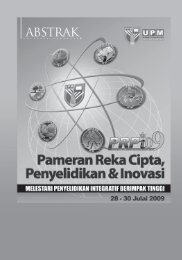BUKU ABSTRAK - Universiti Putra Malaysia
BUKU ABSTRAK - Universiti Putra Malaysia
BUKU ABSTRAK - Universiti Putra Malaysia
Create successful ePaper yourself
Turn your PDF publications into a flip-book with our unique Google optimized e-Paper software.
Identifying Psychiatric Disorders among Older Persons Living in the Community:<br />
A Comparison between Clinical Diagnosis and GMS-AGECAT in Johor, <strong>Malaysia</strong><br />
Assoc. Prof. Dr. Tengku Aizan Hamid<br />
Suraya Yusoff, Esther Gunaseli Ebenezer, Chai Sen Tyng and Siti Suhailah Abdullah<br />
Institute of Gerontology, University <strong>Putra</strong> <strong>Malaysia</strong>,<br />
43400 UPM Serdang, Selangor, <strong>Malaysia</strong>.<br />
+603-8947 2750; tengkuaizan06@gmail.com<br />
Keywords: Psychogeriatrics, validity, GMS-AGECAT, community<br />
Computer Games Development and Appreciative Learning Approach for Creative<br />
Perception Enhancement<br />
Assoc. Prof. Dr. Wan Zah Wan Ali<br />
Eow Yee Leng, Rosnaini Mahmud and Roselan Baki<br />
Faculty of Educational Studies, University <strong>Putra</strong> <strong>Malaysia</strong>,<br />
43400 UPM Serdang, Selangor, <strong>Malaysia</strong>.<br />
+603-8946 8174; wanzah@educ.upm.edu.my<br />
Keywords: Creative perception, appreciative learning approach, appreciative inquiry theory<br />
125<br />
Social Sciences<br />
The Geriatric Mental State (GMS) is a widely used psychiatric assessment for older persons, with a<br />
computerized algorithm (AGECAT) generating diagnosis for nine (9) syndromes. This study aims to investigate<br />
the level of agreement between a GMS-AGECAT diagnosis and clinical diagnosis of mental disorder among older<br />
persons living in the community. A two-phase epidemiological design was used where trained, lay interviewers<br />
first administered translated versions of the GMS (B3) to an nationwide older <strong>Malaysia</strong>n sample (n = 2,980) in<br />
a door-to-door survey. The GMS B3 generates diagnoses for organicity, depression and anxiety disorder on six<br />
levels of confidence (0 - 5), with levels 3 and greater representing likely cases warranting professional intervention.<br />
Out of 381 respondents in the state of Johor, 120 older persons were randomly selected for home examination<br />
by a clinical psychiatrist (geriatrics) who is blind to the Phase 1 results. A comparison of the diagnoses derived<br />
from the lay interviewers and the clinician yielded an overall agreement of 76.2% (n = 105) with a moderate<br />
Kappa value of 0.502 (95% CI 0.319 - 0.649) [sensitivity = 67.4%; specificity = 82.3%]. Further analysis showed<br />
that the GMS-AGECAT (B3 version) reported higher agreement for organic disorders but not depression. In<br />
addition, higher level of education was associated with increased sensitivity, especially for organicity. Due to<br />
limitations of a small sample size, attrition and lapse of time in between the two phases, further studies are<br />
needed to determine the cross-cultural validity and reliability of the GMS-AGECAT algorithm among the older<br />
population in <strong>Malaysia</strong>. Its adoption would enable a rapid and accurate screening assessment of mental disorders<br />
by non-clinicians in a community setting.<br />
Creativity is an important entity in developing human capital while computer games are the current generation’s<br />
contemporary tool. A research had carried out to enhance creative perception among lower secondary school<br />
students. The study applied randomised subjects, with control group experimental design, which involved 69<br />
<strong>Malaysia</strong>n form one students, aged 13-14 year-old. Appreciative learning approach, which based on Appreciative<br />
Inquiry (AI) theory, was administered on treatment group. Meanwhile, control group adopted self-paced learning,<br />
followed by do-it-yourself session. Previous studies showed that although appreciative learning approach is still<br />
at its infancy stage of development, the approach is gaining its momentum in educational settings as it focuses on<br />
strengthening a person’s capacities and potential. In this study, students’ creative perception was assessed through<br />
Khatena-Torrance Creative Perception Inventory (KTCPI). Treatment group gained a mean score of 71.82, which<br />
was significantly higher at .05 level of significance compared to the mean score of 50.49 exhibited by the control<br />
group. Therefore, appreciative learning approach has the potential to be a new pedagogical strategy in enhancing<br />
students’ creative perception in educational settings.



